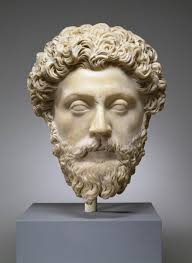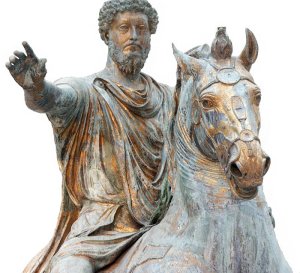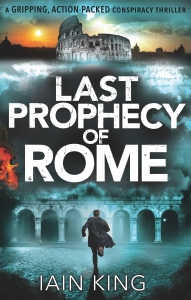One of Rome’s most remarkable rulers, Marcus Aurelius (121-180AD) is commonly described as ‘The last of the five good emperors’. Along with his predecessors – Nerva, Trajan, Hadrian, and Antonius Pius – Marcus Aurelius brought stability to an unstable Empire; between them, the five provided almost a century of competent government, now regarded as Rome’s heyday. But it was Marcus Aurelius, the philosopher emperor, who inadvertently brought this golden age to an end.

Marcus Aurelius was singled out for an imperial life when he was still a teenager: the dying Hadrian instructed his successor, Antonius Pius, to adopt the young philosopher. Antonius Pius, one of longest serving emperors, became infirm in his last years, so Marcus Aurelius gradually assumed the imperial duties. By the time he came to power, in 161, Marcus Aurelius, was already well practiced in public administration.
Aurelius immediately became the first emperor to appoint a co-ruler. It was a clever arrangement: it made it much harder for usurpers to snatch power, since they had to assassinate two rulers, not one. It also recognised that the empire had become too huge to administer from a single capital. Aurelius’ cousin, Lucius, was given responsibility for the eastern half of the Roman domain, and made responsible for confronting Persia, which had just moved into the buffer state of Armenia. Recognising flaws in Lucius’ character, Marcus Aurelius made sure his co-emperor was accompanied by trustworthy generals. Even so, Lucius’ victorious five-year campaign was marred when his army shamelessly plundered a city after it had surrendered.
Although he was far from the action, the campaign in the East shaped Marcus’ reign in three ways. First, it meant the emperor was left to concentrate on administration and public affairs. Contemporary accounts describe his as very judicious and deeply interested in the processes of government. Even stripping away a propaganda quotient, it is reasonable to assume Marcus had an affinity for the decisions demanded by high office. He would certainly need it, because of the two further implications of the Parthian campaign.

Lucius’ soldiers didn’t just come home with wars trophies; they also brought back a plague. Possibly a strain of smallpox, it killed some five million Roman citizens – up to 10% of the Empire’s population – including the co-emperor, Lucius, in 169. As well as the naturally destabilising Rome, the plague made the Empire vulnerable for invasion.
To garner forces for the Middle-East campaign, Marcus Aurelius had strategically slimmed down his troops on the long European frontier – roughly demarcated by the Rhine and the Danube rivers. Aware he was weakening his defences, he warned his local governors against provoking the borderland tribes. It didn’t work. Germanic tribes and nomads raided west into Gaul, and in 166, a much more serious invasion was launched by the Marcomanni of Bohemia, breaching their alliance with Rome.

Marcus Aurelius was forced to act. Unlike previous emperors, who had spent many years campaigning in the Provinces, Aurelius was a relative novice at expeditionary warfare. But he duly left for the front, stationing himself in modern-day Serbia and Austria, in an effort to repulse the invasion.
Aurelius suffered two significant early defeats, and the barbarians crossed the Alps and led the first successful invasion of Italy for two-and-a-half centuries, attacking the Roman cities of Aquileia and Oderzo.
It was during these campaigning years that Aurelius wrote his famous meditations. Removed from the cultural and intellectual life of Rome, he may have turned to philosophy for mental stimulation. But the books also reveal a moral exploration – as if the Emperor were searching for guidance as he made testing and important decisions without any source of reflection other than himself. He concludes on advice which is at odds with the brutality of his situation. Whereas many in the Roman world had no qualms about being cruel, and some even revelled in it, Marcus Aurelius reveals himself to be a considerate, even sensitive man.

Marcus Aurelius’ remained on the front until the climax of his wars against the Germanic tribes. He won perhaps his most important battle at the end of 173, fought over a frozen part of the river Danube. The Quadi and Iazyges tribes had formed an alliance; the Emperor was significantly outnumbered and became surrounded. But Aurelius ordered his men to form square, with shields passed to the front rank, and cavalrymen (including himself) protected in the centre. Even though the tribesmen had trained their horses to ride over ice, they were unable to break the Roman formations and, in close-quarter fighting, superior Roman discipline won out. The Quadi and Iazyges were routed and, by 175, Marcus Aurelius was able to insist both tribes accept punitive peace terms.
Marcus Aurelius almost crushed the whole Germanic threat, but died in 180 before what was to be the final confrontation. Commodus, his son, successor and by all accounts a megalomaniac, wasted their advantage so he could return to the pleasures of Rome. For all his wisdom, Marcus Aurelius had entrusted a vain teenager with imperial office (Commodus is depicted with some accuracy in the film ‘Gladiator’). The move established the principle of genetic rather than meritocratic inheritance within Rome, one of the principle reasons for Rome’s long, drawn out decline.
 Marcus Aurelius was undoubtedly a great man: an intellectual who navigated Rome masterfully through severe difficulties. The tragedy is that his philosophy – which is about self-restraint, duty, and respect for others – was so abjectly abandoned by the imperial line he anointed on his death.
Marcus Aurelius was undoubtedly a great man: an intellectual who navigated Rome masterfully through severe difficulties. The tragedy is that his philosophy – which is about self-restraint, duty, and respect for others – was so abjectly abandoned by the imperial line he anointed on his death.
How much will history repeat itself? Read the action-packed thriller, ‘Last Prophecy of Rome’ to find out.
Available NOW to pre-order: from Amazon (UK) and Amazon (US).

[…] is tragic about Marcus, as one scholar wrote, is how his “philosophy—which is about self-restraint, duty, and respect for others—was so […]
LikeLike
[…] is tragic about Marcus, as one scholar wrote, is how his “philosophy — which is about self-restraint, duty, and respect for […]
LikeLike
[…] is tragic about Marcus, as one scholar wrote, is how his “philosophy—which is about self-restraint, duty, and respect for others—was so […]
LikeLike
[…] is tragic about Marcus, as one scholar wrote, is how his “philosophy — which is about self-restraint, duty, and respect for others — was […]
LikeLike